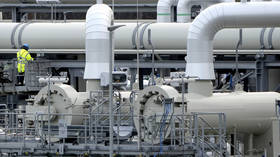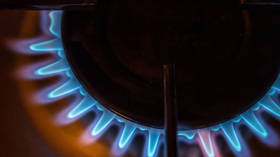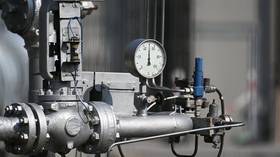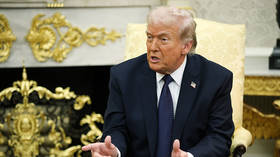German trade unions explain what would happen without Russian energy

Germany will see its major industries like steel, chemicals and paper shut down in a matter of weeks if it’s left without gas, oil and coal from Russia, the country’s top industrial unions have said.
The heads of IG Metall, IGBCE and IG Bau unions held a joint press-conference in Berlin on Tuesday to warn about the potential fallout of the German government’s push to cut reliance of Russian energy in response to the ongoing conflict in Ukraine.
“Exploding energy prices, but above all a possible gas embargo, would hit energy-intensive industry – the mother of the industrial network – hard,” Michael Vassiliadis, president of Germany’s IGBCE chemical workers union, pointed out.
“The consequences would not only be reduced work hours and job losses, but also the rapid collapse of the industrial production chains in Europe – with worldwide consequences,” he added.
Halting Russian gas, oil and coal imports will put 3.4 million employees in the German construction industry at risk, as it totally relies on lime and cement, which requires a lot of energy to produce, Robert Feiger, who heads IG BAU construction workers union, pointed out. “The federal government must do everything in its power to ensure energy supply despite the current crisis situation,” he insisted.
His colleague from the metalworkers’ union IG Metall, Jörg Hofmann, also spoke about the danger of disrupting industrial production chains due to them being “of fundamental importance for Europe as a place of business.” He called upon the German government to provide support to companies and protect the employees in the event of production cuts caused by “excessive energy costs.”
Russian President Vladimir Putin has ordered gas payments from “unfriendly” countries, which include the EU, to be made only in Russian rubles from March 31.
Moscow said it can’t rely on the dollar and euro anymore after its central bank reserves were frozen in the West, as part of draconian sanctions over the military activity in Ukraine.
The EU and G7 have so far rejected the new rules, with Kremlin warning on Tuesday that Russia isn’t going to supply gas to Europe “for free.”
Germany, which is EU’s largest economy, gets more than half of its fossil fuel from Russia. The country’s economy minister Robert Habeck said earlier that Berlin will be able to cut reliance on Russian oil and coal by the end of 2022 but giving up on gas won’t be that easy.
According to Habeck, at least two LNG terminals will be built to help reduce Germany’s dependence on it. Berlin plans to turn to Qatar and the US to compensate for Russian gas despite it being a more expensive option.














